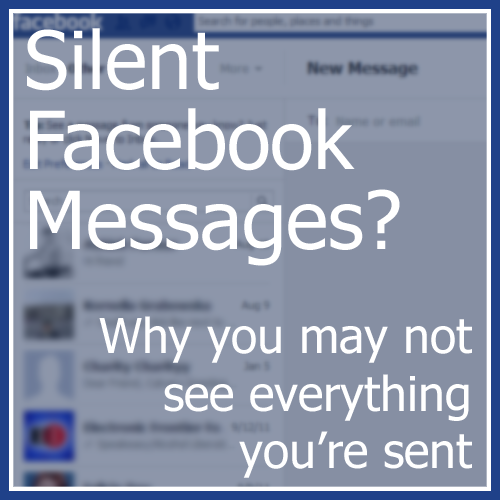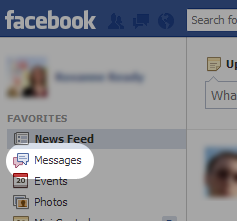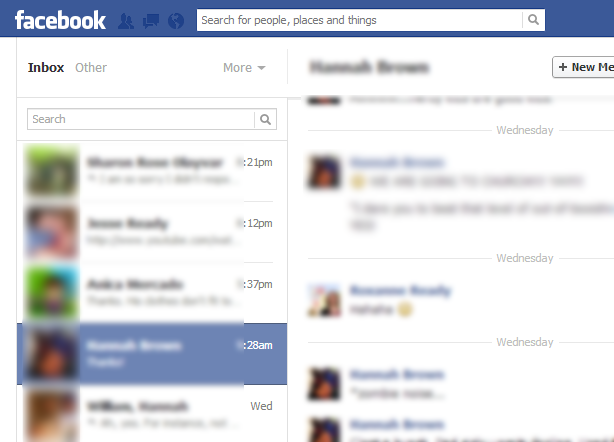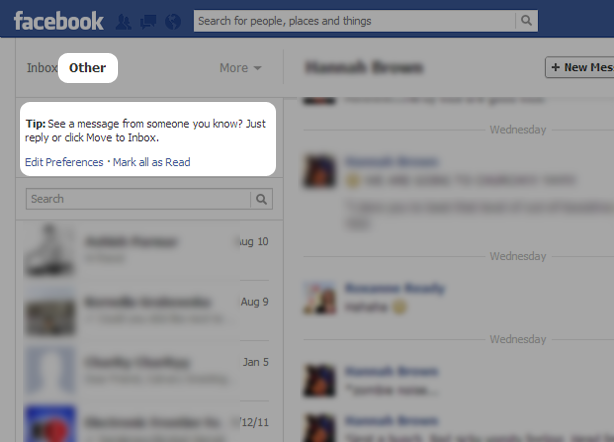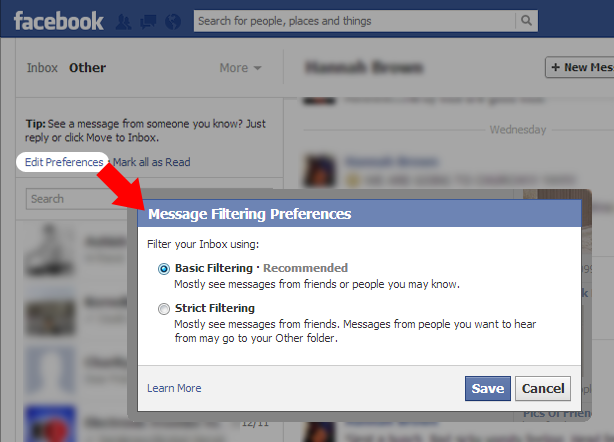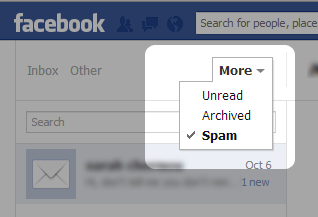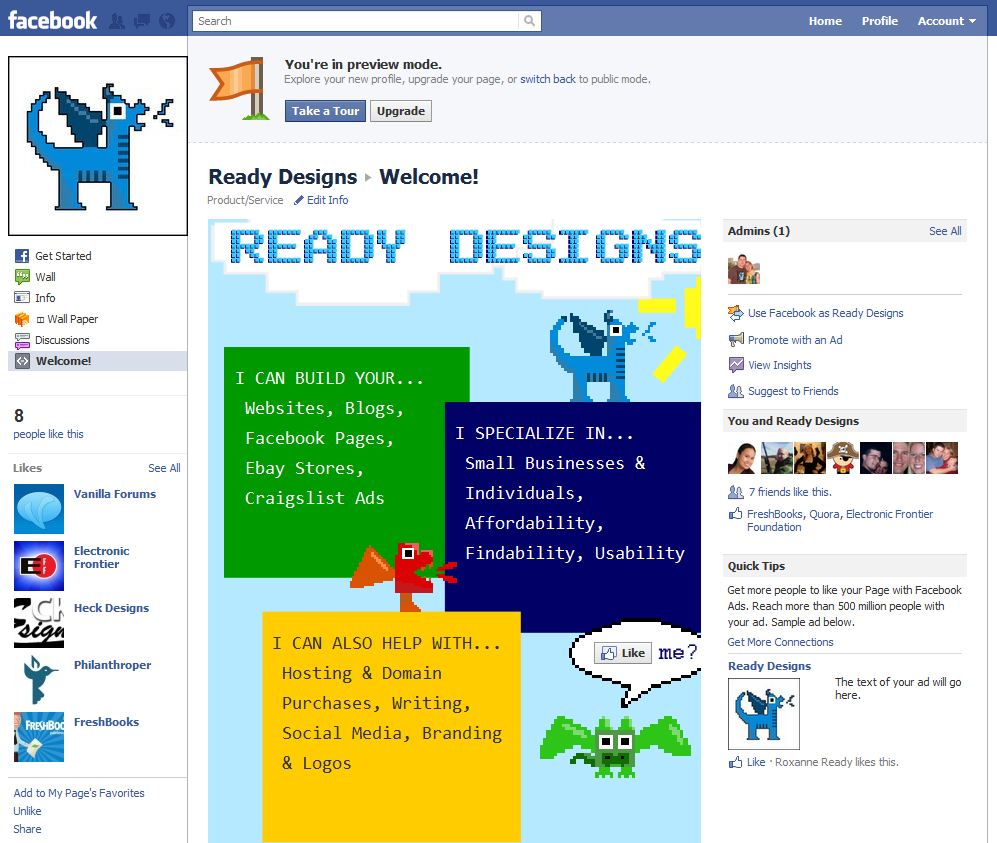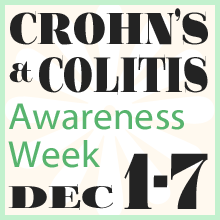Facebook really loves to play Popularity Police. If you don’t like enough of a Page’s posts, they stop showing in […]
Silent Facebook Messages? Why You May Not See Everything You’re Sent
December 20th, 2012
Facebook really loves to play Popularity Police. If you don’t like enough of a Page’s posts, they stop showing in your News Feed. If it doesn’t deem your post “important”, many of your friends won’t even see it.
Did you realize that Facebook also automatically filters what messages make it into your Messages “Inbox” folder? If Facebook doesn’t think a message is from someone you want to hear from, it gets sent into an “Other” folder. Did you even notice you had an “Other” folder? I know I didn’t.
First, getting to the Messages page. You can either click on this:
Or this:
Which will bring you here:
What I’d never noticed before was the “Other” text next to the “Inbox”. This is what it looks like when you click “Other”:
As it turns out, Facebook has been quietly secreting away a number of messages, including some of those sent by people requesting friendship, as well as messages from Pages. (Did you even know Pages could send you messages? I didn’t. Probably because I’d never noticed I’d gotten any.)
There is a handy “Edit Preferences” link near the top which you may have noticed, but don’t get too excited. As you can see below, there is no way to turn off Facebook’s automatic filtering.
You either get to “Mostly see messages from friends or people you may know” or “Mostly see messages from friends”.
What this means is that when I got a message from someone outside my known circles (another continent, no mutual friends, but still a legitimate message), it was tucked away in my Other folder without notification, and I didn’t even realize it was there. I’d been unintentionally ignoring this message for months.
There is also a “Spam” folder I wasn’t aware of:
You may want to poke around in it now and again to be on the safe side — although there was only one, definitely spam message in mine (and plenty of spam in my “Other” folder).
But here’s the punchline. Look what’s at the bottom of this quiet, non-notifying, largely unknown “Other” folder:
Facebook was sending their Site Governance messages to the “Other” folder. No wonder none of us got them.
Facebook Pages Update, Lose Width… Again
February 10th, 2011
Facebook is rolling out yet another change to the Pages feature, which is optional for now but will be pushed on March 1, 2011. Keep Reading
Facebook Privacy and Policy – Summary of the Mess
May 12th, 2010
This is going to be a mini-post, the simple purpose of which being to aggregate some of the more telling articles I’ve found discussing Facebook and its recent policy changes. I don’t like sensationalism and I don’t like hype, but some of Facebook’s recent decisions have been downright disturbing. I hope you will take the time to read through the articles posted here and form your opinions based on all the facts at hand.
My first inkling of any problems came with the Google engineer protest. After Facebook announced their decision at F8 to make user data accessible to third party sites by default, many high profile people from Google left the social media giant. Obviously people working for Google have a bit of a conflict of interest, but their stand got people talking. Soon, Google employees weren’t the only high profile individuals shutting down their accounts.
Next, I ran across this article about changes to Facebook profile linking practices. The Electronic Frontier Foundation (EFF), leader in digital consumer rights advocacy, also posted a short and telling summary of these new changes. Facebook decided to begin interlinking everything posted on a user’s profile with pages throughout its sites and make that information available across the Web. If you type the name of your school, Facebook will link that text to a page with your school’s name – even if there is another school on Facebook with the same name that you never attended. It even adds some connections automatically based on “likes”. Apparently, the only way to opt out of this auto linking is to remove the data from your profile; and even then, Facebook will remember the information. Cre8pc rightly called this “the most obscene, bizarre gesture of blatant disregard for users I’ve ever witnessed.”
The drama continued. According to PCWorld, in late April the Electronic Privacy Information Center along with 14 other consumer protection groups lodged a formal complaint against Facebook with the Federal Trade Commission over the various privacy violations the company was committing. The EFF also began to take serious interest. It posted an article detailing the clear degradation of Facebook privacy rights since its inception, as well as one explaining just what Facebook’s policy changes mean to the end user. (When a bug allowed users to view the private chats of others right in the middle of the controversy, Facebook opponents had a field day.) Gizmodo published a clear summary of its complaints against Facebook with an article titled “Top Ten Reasons You Should Quit Facebook“, followed shortly thereafter by a follow-up post, “More Reasons Why You Should Still Quit Facebook“.
One of the biggest problems with the privacy issues is how difficult it is to set your privacy options. NY Times posted this infographic illustrating the confusing process for setting Facebook privacy options.
After nearly a month of hubub, public policy VP Elliot Schrage finally responded to user complaints with a promise to “do better”. “Clearly,” he said, “we need to rethink the tempo of change and how we communicate it. Trust me. We’ll do better.”
Updates:
- Added May 13, 8:40AM: “Facebook Calls an All Hands Meeting on Privacy” for today at 4PM Pacific.
- Added May 14, 9:00AM: The EFF points out that Facebook is blatantly disregarding its stated principles, enacted a year ago from a 75% user vote.
- Added May 14, 11:00AM: If you’re sick enough of Facebook disrespecting your data to take action, check out Quit Facebook Day.
- Added May 14, 11:45AM: Looking for a Facebook alternative? Diaspora is getting some serious press. Facebook was started in a college dorm; why not its competitors?
I’m not an impartial observer, here. I’m truly disturbed by the moves Facebook is making and the disregard it is showing its users, even as it inserts itself deeper into the Web and becomes harder to simply walk away from. Please, add your thoughts and any links you think would be valuable to the discussion in the comments below.

